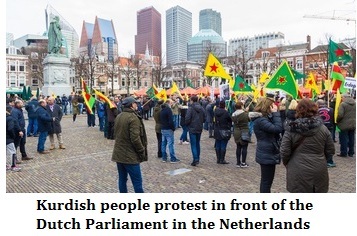

Diaspora refers to dispersion of people from their homeland to host countries due to various reasons through migration.
Studying diaspora is important because people have been migrating since centuries. Their experiences, hardships, political, social, economic and cultural engagements in both the homeland and host country should be investigated to understand their role as citizens of a nation or more than one nation. Research suggests that diasporic communities can largely contribute to nation-building through migration but it needs to be noted that migration studies and diasporic studies are two different genres.

Bus for evacuating refugees in war torn Ukraine. This is an example of forced migration
The word Diaspora originated from the Greek word “Diaspeiro”, where ‘dia’ means across and ‘speiro’ means scatter. The term refers to people who have migrated to other lands and have settled in that land but still have strong connections with their birthplace or homeland. The reasons for their migration could be political, familial, economic or other.
The appearance of the term was found in 2nd century BC in ‘Septuagint’ which is the Greek translation of the ‘Old Testament’. The term appeared in relation to the expulsion of the Jewish from their homeland which was then Israel during the 8th and 6th centuries. This event occurred when the Jewish were defeated by the Romans in Palestine.
In the book named ‘Diasporas in Modern Societies: Myths of Homeland and Return’ of 1991 by William Safran, the diasporic community has been said to have certain characteristics. These characteristics are −
They or their ancestors have been dispersed in a foreign land at a certain period of time.
They retain history or memory of their homeland.
They regard their ancestral home as their original home where they wish to return in future.
They feel that their host country cannot accept them completely and hence the feeling of being alienated.
They can relate to the culture, tradition and customs of their ancestral homeland and wish to restore their lost homeland.
Even though these characteristics are well recognized in the sociological understanding of diaspora or diasporic communities, it is important to note that many sociologists have associated the term diaspora with migration, globalisation, displacement, partition, borders or an interrelation among these terminologies. Hence, diasporic studies explore the roles, situations and experiences of certain people or sections of people in the foreign land. This is different from migration studies that are inclined towards understanding and researching the reasons and experiences of migration. For example, in his book of 2007 named ‘The Literature of the Indian Diaspora: Theorising the Diasporic Image’, Vijay Mishra illustrates how the story of Ram’s exile in Ramayana is one of the best examples of diasporic experiences.
The connection between diaspora and politics is quite inevitable. Historical research on migration and migrants has always found evidence of various kinds of political engagements since the last 100 years. These included electoral or non-electoral engagements in politics.
Different diasporic communities or groups may try to influence the government of their host country in order to get certain facilities in their favour or in the favour of their homeland. Demands may include relaxation of certain criteria for jobs or migration in the host country. These groups may also encourage or pressurise their host country to challenge certain laws or decisions of their homeland government. Political engagements of diasporic communities may also include sending financial or other kinds of support to political parties, terrorist organisations or civil society groups or other interest groups in their homeland with the help of their host country.
Similarly, these communities can mobilise and organise mass protests in their host country in favour of or against certain events in their homeland. For example, when Abdullah Ocalan, a Kurdish leader was captured in 1999, the Kurds conducted mass protests in various parts of the world. With the help of these kinds of demonstrations diaspora groups can generate worldwide support by raising their issues on an international platform.
It is often noticed that diasporic communities have dual citizenship which influences their migration and affects the migration demographics of the host countries. For example, during elections in the homeland counties diasporic communities may migrate to their homeland in large numbers even for a very short period of time. This may impact the host country's elections since the diasporic communities may not register themselves for voting in the host country. The January 2005 election in Iraq witnessed this situation.
Diaspora also comes with few problems in terms of expatriates' divided loyalties. When such conflict of loyalties arise it has been seen that expatriates tend to follow their host countries where they lived, worked and raised their children. But in general these individuals carry mixed identities, feelings and they belong to both host and origin country. It has also been realised that political and socio economic integration are more prevalent than the cultural and relational assimilation.
Diaspora, the population which originates at one place but migrates to another place remains culturally and ethnically different from the host country. Communities become diasporic due to several factors but they have meaningful influence on the home country and host country. They influence nation building, citizenship, issues of loyalties, migration and other major political factors which ultimately influences socio-economic and cultural factors of both the host and home countries.
Q1. What is the relationship between gender roles and diaspora?
Ans. Gender roles and Diaspora are related in the sense that migration from home country to host country may transform gender roles. Research suggests that women who migrate to host countries for better economic opportunities tend to take up jobs and become economically dependent which impacts their gender role at home and challenges their partner’s gender role.
Q2. What are the two types of Diaspora?
Ans. Diaspora can be of different types depending on the reasons for migration. Among them two types are −
Trade Diaspora − Migration for and through open trade routes and links such as the Chinese and Lebanese diaspora.
Imperial Diaspora − Migration in order to serve and build empires such as the British French diaspora.
Q3. What is the relation between diaspora and nation-building?
Ans. Historical investigation suggests that diaspora highly influences nation-building mostly in poor countries or developing countries due to availability of resources, communication, and influence of the host country. One example is how Mahatma Gandhi contributed to India’s nation-building after returning from South Africa.